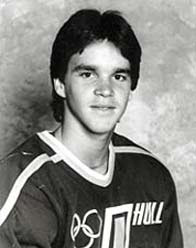 The Montreal Forum was empty. The custodial staff were beginning to sweep up.
The Montreal Forum was empty. The custodial staff were beginning to sweep up.Most everyone had left the 1984 NHL entry draft when one player heard his named called--9th round, 171st overall, the Los Angeles Kings choose Luc Robitaille. He walked down to the Kings table, after convincing security he really was a player that had just been drafted, where a Kings representative gave him a pin to wear---they were out of sweaters and caps.
Robitaille was considered to be a big long shot at ever making an NHL roster.
Scouts said he was slow, an average to poor skater.
And the The Hall of Fame? Laughable.
But there was one scout who believed in him. Literally one. Alex Smart saw Luc Robitaille's determination, his dedication to his craft, his work ethic, and went to bat with the Kings brass to give him a shot.
Robitaille was sent back to junior early in his first two training camps.
But he persevered.
Robitaille thanked Smart, who passed on a few years ago, in his recent Hockey Hall of Fame induction speech. It was the belief by one person that allowed Robitaille's singular belief in himself to take over and flourish.
Luc Robitaille played 19 seasons in the NHL, amassing 668 goals and 1,394 points, making him the highest scoring left winger in NHL history, and 20th overall scorer of all-time.
To be sure, there are similar stories about players who no one really believed in and who achieved great things, but very few who are Hall of Fame inductees. Luc Robitaille is a shining example of how will and determination can make the level of achievement one seeks limitless.
One man, who no one really believed in, stands in the Hall that only a small handful of players are privileged enough to be a part of, all because he thought he could, and someone else saw that in him.




